 Roger Corman, master of the low-budget, independent exploitation picture, turns 80 years old today, and a bunch of us around the blogosphere have taken up Tim Lucas’s tight-turnaround request for a commemorative Roger Corman Blog-a-Thon in our teeth and will proceed to shake it for all it's worth today.
Roger Corman, master of the low-budget, independent exploitation picture, turns 80 years old today, and a bunch of us around the blogosphere have taken up Tim Lucas’s tight-turnaround request for a commemorative Roger Corman Blog-a-Thon in our teeth and will proceed to shake it for all it's worth today.For many, mere mention of the name Roger Corman is to conjure images of Boris Karloff, Jack Nicholson and Dick Miller in tights, of Vincent Price quothing The Raven forevermore, of Peter Fonda and Bruce Dern and their boss hogs in The Wild Angels, of Robert Vaughn as the Teenage Caveman, of Ray Milland’s X-ray eyes, of man-eating plants and beatniks creating art out of artfully posed corpses.
For me, thinking of Corman is to think of all these things, all these people, all these films. But I usually gravitate toward the Corman of New World Pictures, probably because these were the pictures being made, and splashed all over the movie pages of the Portland Oregonian, when I was a movie-loving teenager in the ‘70s. I don’t think I ever saw one of them in a drive-in or anywhere else during that time, but the advertising was enough to fuel a thousand fantasies about the actors involved, the rough-and-tumble scenarios of the films themselves, and how exciting actually getting to see one would inevitably be. (For an excellent consideration of one great piece of ad art for a Corman classic, be sure to check out That Little Round-Headed Boy’s terrific analysis of the one-sheet for Big Bad Mama, his contribution to today’s blog-a-thon. TLRHB also provides a link to the poster’s artist, John Solie, who you will be delighted to find out created some of the most indelible images of movie advertising to come out of the era of ‘70s exploitation films.)
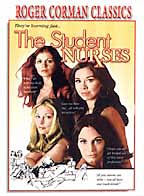 When I finally started catching up with the New World of Roger Corman in the 1970s during my college days, a period extending roughly from The Student Nurses (Stephanie Rothman, 1970) up through Humanoids from the Deep (Barbara Peeters, 1980), I can say I was rarely disappointed. However, Humanoids seems a good dividing line for Corman between the relatively innocent cynicism of the ‘70s films and a more self-conscious nihilism that seemed to take over New World films in the following decade, and the transition seems to have happened midway through the film itself.
When I finally started catching up with the New World of Roger Corman in the 1970s during my college days, a period extending roughly from The Student Nurses (Stephanie Rothman, 1970) up through Humanoids from the Deep (Barbara Peeters, 1980), I can say I was rarely disappointed. However, Humanoids seems a good dividing line for Corman between the relatively innocent cynicism of the ‘70s films and a more self-conscious nihilism that seemed to take over New World films in the following decade, and the transition seems to have happened midway through the film itself.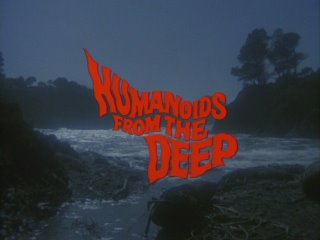 On the surface, Humanoids was a grotty sci-fi shocker in a very familiar mode, and the concept behind it is typically tasteless-- aquatic mutants go on a rampage of rape aimed at crossbreeding wit humans to create a new master race of dominant amphibious species. But Humanoids was a B-movie shot in the shadow of Alien, itself a B-movie with A-list trimmings, and the realization of Corman B-movie roots being subsumed by mainstream Hollywood seems to send strange shock waves through the filmmakers and their film. Humanoids ends up seeming like an angry attempt to reclaim the grotesqueries which used to be the sole province of the drive-in B-movie by mindlessly trumping Alien’s signature shock set pieces. By the time I witnessed the horrifically bloody forced Caesarean birth that caps Humanoids, I felt like I’d truly had enough of the recycling aesthetic of Roger Corman.
On the surface, Humanoids was a grotty sci-fi shocker in a very familiar mode, and the concept behind it is typically tasteless-- aquatic mutants go on a rampage of rape aimed at crossbreeding wit humans to create a new master race of dominant amphibious species. But Humanoids was a B-movie shot in the shadow of Alien, itself a B-movie with A-list trimmings, and the realization of Corman B-movie roots being subsumed by mainstream Hollywood seems to send strange shock waves through the filmmakers and their film. Humanoids ends up seeming like an angry attempt to reclaim the grotesqueries which used to be the sole province of the drive-in B-movie by mindlessly trumping Alien’s signature shock set pieces. By the time I witnessed the horrifically bloody forced Caesarean birth that caps Humanoids, I felt like I’d truly had enough of the recycling aesthetic of Roger Corman.But there were so many delights that came in the decade before. The “Nurse” movies-- The Student Nurses, Private Duty Nurses (George Armitage, 1971), Night Call Nurses (Jonathan Kaplan, 1972) and Candy Stripe Nurses (Alan Holleb, 1974)—were unpretentious delights of exploitation mixed with social commentary that would provide a very profitable template for the producer in the coming years, as would the female prison series embodied by titles like The Big Doll House (Jack Hill, 1971), Women In Cages (Gerardo De Leon, 1971), The Hot Box (Joe Viola, 1972) and The Big Bird Cage (Jack Hill, 1972) and Caged Heat (Jonathan Demme, 1974). Corman turned director Steve Carver loose on the gangster picture, and he came up with two solid entries-- Capone (1975) starring Ben Gazarra, and Big Bad Mama (1974) starring, of course, Angie Dickinson. And the candy-colored anarchist satire of Paul Bartel’s Death Race 2000 (1975) and Allan Arkush’s Rock and Roll High School (1979) are close to irresistible.

"If it's a good picture, it's a Miracle!"
None of these, however, is as perfect in its nonexistent aesthetic, as endearing in its macro-budget sensibility, or as biting a love letter to the world of dirt-cheap exploitation pictures, simultaneously embracing and lampooning the conditions under which they are (or were) made, as is Hollywood Boulevard (1976), directed by Joe Dante and Allan Arkush. This casual, ragged, coarsely funny, sharply observant comedy is maybe the best movie the Roger Corman of the ‘70s ever put his name on, and nothing he’s done since has come close to its insouciance and crude charm. It was made on a bet, on a dare, by a couple of novices looking for a way into the directing business and stands as a monument to creativity borne of tension, lack of money and materials, and making films about what you know and love, not because anyone is likely to be impressed, but simply because you know and love the subject.
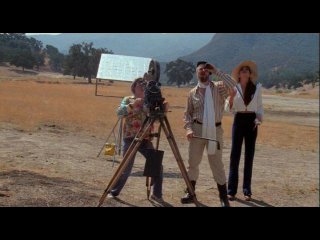 The mythology runs as follows (at least as it is related on the Hollywood Boulevard DVD commentary hosted by Dante, Arkush and the film's producer Jon Davison)—Davison was having lunch with Corman one day and made the boss a bet that he could turn in a theatrically releasable movie for less money than had ever been spent on a New World production up to that time. This was, of course, a concept the notoriously frugal Corman could really get behind, and his only insistence was that there be, as was his typical demand, regular infusions of nudity and violence into the film, for marketing purposes, of course. Davison recruited Dante and Arkush, who were cutting trailers for New World at the time, to direct, and soon they were cobbling together a script (officially credited to Patrick Hobby, the name of the hapless screenwriter played by Jeffrey Kramer in the film) built entirely around existing action and stunt scenes from previous Roger Corman opuses. The final budget? $50,000. And, to the movie’s everlasting charm and credit, it looks it.
The mythology runs as follows (at least as it is related on the Hollywood Boulevard DVD commentary hosted by Dante, Arkush and the film's producer Jon Davison)—Davison was having lunch with Corman one day and made the boss a bet that he could turn in a theatrically releasable movie for less money than had ever been spent on a New World production up to that time. This was, of course, a concept the notoriously frugal Corman could really get behind, and his only insistence was that there be, as was his typical demand, regular infusions of nudity and violence into the film, for marketing purposes, of course. Davison recruited Dante and Arkush, who were cutting trailers for New World at the time, to direct, and soon they were cobbling together a script (officially credited to Patrick Hobby, the name of the hapless screenwriter played by Jeffrey Kramer in the film) built entirely around existing action and stunt scenes from previous Roger Corman opuses. The final budget? $50,000. And, to the movie’s everlasting charm and credit, it looks it.A sharp eye will notice, cut in amongst footage created by Dante and Arkush of the adventures of an exploitation film crew, headed up by Paul Bartel’s clueless and pretentious director, as they blithely go about shooting a picture a week, a ton of shots from Caged Heat, Death Race 2000, The Terror (seen at a drive-in), Big Bad Mama, Night Call Nurses and Crazy Mama. The existing footage blends well enough with the comedy built around it (not that we’re ever intended not to notice anyway), and it serves to pad the action and save Dante and Arkush thousands of dollars, as well as the embarrassment of having to admit that they wouldn’t know how to shoot such sequences themselves anyway.
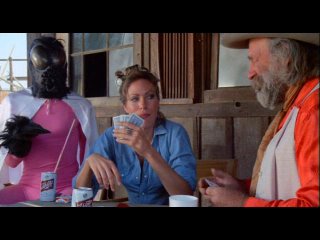
"Buzz off!"
Dante calls it, on the commentary track, “a big home movie about the making of this movie.” And it’s certainly about the making of just about every other Roger Corman movie of the period too. But for all the comedy that blooms at the expense of Corman, the notoriously penny-pincher, Hollywood Boulevard is a movie of a remarkably sunny disposition, its cynicism balanced by a belief in, if not a love of movie production, then certainly in the movies themselves. The Corman figure here is embodied by Bruno Kirby look-alike Richard Doran as “P.G.,” and it’s a mark of the movie’s genial attitude toward this casting-couch sleazeball that when an actress incorrectly refers to him as “G.P.,” another responds, “It’s P.G., not G.P.” and the first woman’s only response is an affectless “Whatever.” Any movie about exploitation filmmakers that can link one of its central figures to a way-inside, utterly tossed-off joke about a change in the M.P.A.A. ratings system that was already old news by a couple of years in 1976—and have it be about the “PG” rating and not the sacred “R,” for heaven’s sake-- has definitely got its heart in the right place. And as if any further evidence of this proper pulmonary location is needed, Dante and Arkush intercut a typical picnic-in-the-grass romantic montage between the movie’s pie-eyed protagonists with Commander Cody and the Lost Planet Airmen performing their gleefully obscene speed-freak country ditty “Everybody’s Doing It.” It makes absolutely no logical sense, but the movie hits a high off of this scene that infuses everything that comes after and happily takes the rest of the movie's running time to dissipate.

"Truckin'/Truckin'/Fuckin'/Fuckin'/Everybody's Doin' It Now"
But then, the entire cast has their hearts in the right place too; it’s a cast led by exploitation stars, low-budget filmmakers and veteran professionals that are, to a member, more casually appealing and blessed by sharper timing than they would be in almost anything else they did. Candace Rialson, in 1976 very much a sought-after starlet—she graced Holleb’s Night Call Nurses two years before, and would star the following year in a very popular exploitation comedy about a girl and her talking vagina called, strangely enough, Chatterbox-- is immensely appealing as the wide-eyed Midwest hopeful to hits Hollywood with plenty of big dreams and ends up driving a getaway car in a bank robbery (she thinks she’s been recruited as a stunt driver) before ever hooking up with the good folks at Miracle Pictures (“If It’s a Good Picture, It’s a Miracle!”) and becoming a star (sort of). Jeffrey Kramer, who later than same year would be seen patrolling the beaches with Roy Scheider’s Chief Brody in Jaws, plays the aforementioned Patrick Hobby with a loose-limbed, wisened-up Jimmy Olsen that is very appealing. (It’s a central joke embedded in Dante and Arkush’s premise that Rialson, all fresh-scrubbed and beauteous and straight off the farm, looking to hit the fast track to fame and fortune in the movies, should immediately hook up with the screenwriter.)

"Careful with that axe, Mary McQueen!"
Paul Bartel and Mary Woronov, in the early stages of their roles as exploitation cinema’s answer to Nichols and May, are delightful as the semi-self-deluded director and his nasty, ambitious, deliciously bitchy star—it struck me in seeing the movie again tonight just how unabashedly sexy Woronov could be on screen, which is something considering that the first time I saw her, made up and glowering as the horrific Miss Togar in Rock and Roll High School, I thought she was a female impersonator who bore a strictly unfortunate resemblance to Tim Curry. Rita George and Tara Strohmeier are sexy and funny as the two other starlets, Bobbi and Jill, who round out Bartel’s traveling stock company of hotties. (I actually met Strohmeier once when I first arrived in Los Angeles and came begging to the offices of the Los Angeles Reader, where she was the paper’s film editor, for a job as a film reviewer. I don’t know whether she was impressed or not that I remembered her topless seduction scene in a hammock, where she tries to seduce an unseen lover while swatting mosquitoes off her bounteous chest. All I know is that I didn’t get the job.)
 And, of course, the incomparable Dick Miller is genius as usual as Walter Paisley (the name of the murderous beatnik artist/poseur he played in Corman’s Bucket of Blood, and the name he would always have whenever he appeared in a film directed by Dante). At one point in Hollywood Boulevard, he takes Kramer and Rialson out on an ill-fated visit to a drive-in theater for the world premiere of the shot-in-the-Philippines actioner they just wrapped the week before, and while they’re waiting for the main attraction, they watch Corman’s The Terror, specifically a scene between Miller and Boris Karloff. There’s a nice sense of poignancy about Miller looking at himself on screen with the horror icon, but it’s one of the many things that are right about Hollywood Boulevard that the emotion is never pushed, just acknowledged. We’re to understand that it’s Paisley on screen, not Miller, and that connecting of the dots between Corman’s higher-toned Poe adaptations of the ‘60s and the no-frills B-movie milieu of Hollywood Boulevard is perfectly pitched for a movie so in love with everything, even the cheap sleaze and corner-cutting, about the world of low-budget filmmaking.
And, of course, the incomparable Dick Miller is genius as usual as Walter Paisley (the name of the murderous beatnik artist/poseur he played in Corman’s Bucket of Blood, and the name he would always have whenever he appeared in a film directed by Dante). At one point in Hollywood Boulevard, he takes Kramer and Rialson out on an ill-fated visit to a drive-in theater for the world premiere of the shot-in-the-Philippines actioner they just wrapped the week before, and while they’re waiting for the main attraction, they watch Corman’s The Terror, specifically a scene between Miller and Boris Karloff. There’s a nice sense of poignancy about Miller looking at himself on screen with the horror icon, but it’s one of the many things that are right about Hollywood Boulevard that the emotion is never pushed, just acknowledged. We’re to understand that it’s Paisley on screen, not Miller, and that connecting of the dots between Corman’s higher-toned Poe adaptations of the ‘60s and the no-frills B-movie milieu of Hollywood Boulevard is perfectly pitched for a movie so in love with everything, even the cheap sleaze and corner-cutting, about the world of low-budget filmmaking.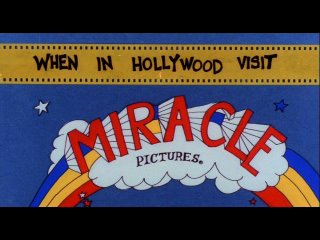 In 1982, a friend and I made our first visit to Los Angeles. I had recently discovered Hollywood Boulevard on cable and in the months prior to our visit ended up seeing it several times and loving it. And because of this movie, I screwed up the courage to contact New World Pictures in order to set up a screening of some of the Super-8 films my friend and I had made in the hopes of getting an in at Corman’s Venice studio. We ended up getting an audience with one of Corman’s producers, a very friendly woman by the name of Mary Ann Fisher, who gave us a tour of the facilities—New World was, at that time, partially located in a converted lumber yard, and several of the sets for Jimmy Murakami’s Battle Beyond the Stars and some other strange interstellar epic starring Klaus Kinski called Android were still standing. We showed her our films, and mid-screening she even took a call for Mr. Corman himself. And all during our meeting I waxed enthusiastic about Hollywood Boulevard, which had even by then gained a following and a measure of notoriety, at least, I suppose, within insider filmmaking circles. I was glad to be able to talk about any work from the New World stable, but particularly about this movie, which I genuinely did love, and I have a feeling that enthusiasm, coupled with her enjoyment of the films we showed her, was a major reason why she told us to come back, hang around and take a very low-paying entry-level gofer-type job with the studio.
In 1982, a friend and I made our first visit to Los Angeles. I had recently discovered Hollywood Boulevard on cable and in the months prior to our visit ended up seeing it several times and loving it. And because of this movie, I screwed up the courage to contact New World Pictures in order to set up a screening of some of the Super-8 films my friend and I had made in the hopes of getting an in at Corman’s Venice studio. We ended up getting an audience with one of Corman’s producers, a very friendly woman by the name of Mary Ann Fisher, who gave us a tour of the facilities—New World was, at that time, partially located in a converted lumber yard, and several of the sets for Jimmy Murakami’s Battle Beyond the Stars and some other strange interstellar epic starring Klaus Kinski called Android were still standing. We showed her our films, and mid-screening she even took a call for Mr. Corman himself. And all during our meeting I waxed enthusiastic about Hollywood Boulevard, which had even by then gained a following and a measure of notoriety, at least, I suppose, within insider filmmaking circles. I was glad to be able to talk about any work from the New World stable, but particularly about this movie, which I genuinely did love, and I have a feeling that enthusiasm, coupled with her enjoyment of the films we showed her, was a major reason why she told us to come back, hang around and take a very low-paying entry-level gofer-type job with the studio.
Walter: "Have you been in pictures?"
Robby: "Not recently. I don't do nudity."
I know my friend wasn’t really interested—he was looking to get back home to his fiancé, and the lure of being a $2.00-an-hour gofer for Roger Corman probably didn’t fit into his future plans too neatly—but I’ve never really squared it in my head why I, being the relatively unfettered one at the time, didn’t take her up on her offer. It probably had something to do with the fact that I was still about five years away from being ready to hurl myself into a world as different from the one I grew up in as that of “Hollywood,” and I was scared shitless at the prospect. But it may also have had something to do with knowing the environment that I was enamored of, as represented however accurately or inaccurately by Hollywood Boulevard, was already something that belonged to another era. Filmmakers like Dante, Arkush, Martin Scorsese, Peter Bogdanovich, Francis Ford Coppola, even Ron Howard, their associations with Corman were all long past, belonging to a time of Corman-influenced (or hampered, depending on who you talk to) filmmaking that was like lightning in a bottle, not likely to be casually reproduced, and a look at the films Corman produced in the ‘80s and ‘90s seems to bear this observation out. This is just another reason why Hollywood Boulevard has such a special place in my heart—it’s a raucous comedy, a bittersweet satire of the movie business, but it’s also a tribute to that very style of fly-by-the-seat-of-your-pants cinematic ingenuity on which Corman built his empire that was made while that style was still flourishing and functioning and still had some juice left in it. It may be ragged and stitched together and weaker at the seams in some places than others, but in the history of films about filmmaking there aren’t too many others, no matter what their budgets and ambitions, that, in my estimation, can stand next to it. I really do think it’s a jewel, a modest masterpiece in this famously frugal producer’s crown of tarnished jewels. He didn’t direct it, but today’s blog-a-thon guest of honor got it made, and for that, coupled with the fact that it’s his 80th birthday, I’m proud to salute Roger Corman and say thank you for all his films, but most especially the tour he provided us in 1976 down a sleazy, sexy, sensationally funny section of Hollywood Boulevard.
(My many thanks to friend and fellow Hollywood Boulevard enthusiast Machine Gun McCain for providing the wonderful screen grabs that make this post so much fun to look at. I owe you at least 10 or 12, MGM!)
*************************************************************************
Blogless reader C. Jerry Kutner, a frequent contributor to Bright Lights Film Journal and proprietor of The Richard M. Powers Cyber Art Gallery, submitted this comment regarding Roger Corman that
I'm happy to post for him:
"One of the greatest things an artist can accomplish is the creation of his own universe. John Ford did it. Peter Jackson did it with his Tolkien trilogy. And Roger Corman did it in his Edgar Allan Poe/H.P. Lovecraft series (House of Usher-1960 through Tomb of Ligeia-1964). Happy Birthday, Roger! May you never be forgotten!"
Thanks for your contribution, Mr. Kutner!
***********************************************************************
More Roger Corman Blog-a-Thon entries available at the following sites:
The House Next Door (Matt Zoller Seitz)
Flickhead (Ray Young)
More Than Meets The Mogwai (Aaron Graham)
That Little Round-Headed Boy
Greenbriar Picture Shows (John McElwee)
Between Productions (Robert Cashill)
Coffee, Coffee and More Coffee (Peter Nellhaus)
FilmZoneX (Dave Bohnert)
Johnny Larue's Crane Shot (Marty McKee)
Lance Tooks' Journal (Lance Tooks)
Nadaland (Robert J. Lewis)
The House of Irony (Steven Wintle)
The Bleeding Tree (Neil Sarver)
VertiBlog (Marty Langford)
Tales from the Lab (Dr. Gangrene)
KGB Productions, Inc. (Karl Bauer)
Giant Monster Blog (Brian O.)
The Exploding Kinetoscope
(Chris Stangl-- from his essay "The Roger Corman That Conquered the World," a spot-on observation relevant to my own piece: "The real lessons of Roger Corman's career are resourcefulness, savvy and taking joy in the doing of the job.")
Thanks again to Tim Lucas for poking us with a sharp stick and getting these out there!

Dennis, wow, what can I say? Among your many posts brimming with intelligence and enthusiasm, this is one of your most heartfelt, as well. This is the kind of writing I live to read on a blog. And need I say instructive? Now, I'll never need to see HUMANOIDS FROM THE DEEP! I've always been so-so on Arkush, I didn't care for ROCK AND ROLL HIGH SCHOOL when I rewatched it last year, although the ending remains gloriously dumb. And Bartel and Woronov, I can only take so much of, too. But you have thoroughly convinced me to get a copy of HOLLYWOOD BOULEVARD. I, too, have a love of Hollywood backstory films, no matter how ragged, so I'll have to try this. Thanks for the memories, and another memorable post!
ReplyDeleteI use to know Jon Davison at NYU. I'm not exactly sure what happened to stop him, but for a while he had a semi-private club where he had screened classic films unavailable elsewhere, vintage Sam Fuller and Corman, and a bootleg print of the then unavailable Scarface.
ReplyDeletePat Hobby was the name of a screenwriter character by F. Scott Fitzgerald.
Great post. I really enjoyed that as someone who also is a big fan of HOLLYWOOD BLVD for all of the reasons you say. I'd also pinpoint the change from innocent exploitation of the '70s to the kind of unpleasant cynicism of the '80s and beyond a little later than HUMANOIDS, although I can see that the seeds are there.
ReplyDeleteI remember having a debate with someone at some point, because it was obvious to me that the mysteriously unnamed Kinks song they wanted for the opening credits was "Celluloid Heroes" with its "Hollywood Blvd." refrain, and I'm certain I'm right, while the other person assumed it was "Low Budget" and I was surprised that there was indeed another possibility that actually made sense and I couldn't be 100% confident in my choice any longer, only 95%.
Just a note, however, the wonderful Dick Miller is named Walter Paisley in fewer than half his appearances in Joe Dante movies, although it's clearly a favorite in-reference for both of them (and me, as well, since I think A BUCKET OF BLOOD is one of Miller and Corman's finest moments, together or seperately). The most notable exception in my mind, however, is the two GREMLINS movie, in which he is most definitely Mr. Futterman.
I tend to think that the unnamed Kinks song to be used for those glorious opening credits was "Celluloid Heroes", but, darnit, you're right about "Low Budget", one I hadn't thought of before. I automatically assumed it was to be "Celluloid Heroes" considering Ray Davies refers to Bela Lugosi's star on the walk of fame, and there's that insert in HB.
ReplyDeleteDennis, thanks so much for this lively post on the merits of HOLLYWOOD BOULEVARD (and for the shout-out!). It's clearly a film that you hold dear and your personal connections with it only make the piece more endearing. It's surely one of the best pieces written on the film.
Thanks, MGM. Coming from someone so well-versed in Corman (and film in general), that means a lot to me. And thanks for chiming in on the Kinks-- I'm afraid I don't know them well enough to even have had an educated guess as to what the song might be.
ReplyDeleteNeil: Of course you're right about Dick Miller's nom de plume in the two Gremlins movies. I blame Chris Columbus. And I appreciate your checking in. Always remember, it's not the human condition; it's tits and ass! (Oh, what a tome the collected words of wisdom of underappreciated auteur Erich Von Lippe would make, eh?)
TLRHB: I really hope you like Hollywood Boulevard. My only regret is never having had the chance to see it at a drive-in. I've occasionally felt the pull to revisit Humanoids from the Deep, but just thinking about it again last night has pushed it further back down my queue-- it's just so damned unpleasant. And what can I say? If this is the kind of writing to live to read on a blog, then I'm honored that you chose to read mine. I'm lucky to have so many smart people, like yourself, checking in here who make me feel like I'm not talking to the walls, and who keep me honest and also aren't afraid to register dissenting opinions (see V for Vendetta!) All this, and a civil atmosphere of fun in the comments column to boot. Who could complain? When you finally do catch up to HB, do let me know wha you think. This discussion may not yet be over! Oh, and consider this a sincere invitation to take part in the next professorial quiz, which, my schedule willing, should be coming up in just a few days. I look forward to reading your responses!
ReplyDeleteWow, that was fun to read--and I've never yet seen HOLLYWOOD BOULEVARD, though I believe you and I have a deal to watch it together when next we meet, if you're not tired of it (haha). I had forgotten about your visit to New World and their offer of employment! Funny to think how things might've turned out if you had taken the job. Thanks for a great post! And HUMANOIDS FROM THE DEEP...well, I haven't seen it since you and I saw it on its original release, so I might be foolish enough to watch it again if the opportunity arises.
ReplyDeleteGreat post, Dennis.
ReplyDeleteHOLLYWOOD BOULEVARD wasn't on my radar at all until today, and is now sitting on top of my 500-strong Netflix queue. I eagerly look forward to seeing it, thanks to this post.
Dennis, oh yeah, I am eagerly awaiting your quiz. Blogs, ballots, quizzes, love 'em all!
ReplyDelete